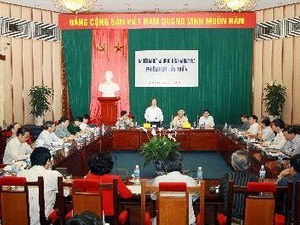(VOVworld) Vietnam is gearing up work on amendments to its 1992 Constitution. The Committee for Constitutional Amendment Drafting convened its 4th meeting on Wednesday in Hanoi to discuss the implementation of the 1992 Constitution and major amendments. It’s a widely-heard opinion that, constitutional reform is necessary to create momentum for the development of Vietnam’s economy, culture, education and society in line with the existing national renewal goals.
 |
The 4th meeting of the Committee for Constitutional Amendment Drafting
(Photo: VNA)
|
The ultimate goal of the constitutional amendments is to build a unified, efficient and streamlined administrative apparatus. In its 2001 revision, the Constitution acknowledges the principle of building a socialist state governed by laws. But this principle is not reflected fully and consistently in specific provisions. The Constitution does not specify which agency exercises executive authority or judicial authority. The role, functions and relationship between state agencies are not clearly defined. Such restrictions hamper the operation of the state apparatus. Nguyen Dinh Quyen, a National Assembly deputy from Hanoi, told VOV: “The 1992 Constitution stipulates the comprehensive reform of our economic, cultural and social status as well as citizens’ fundamental rights, but retains the basic models of state agencies, which were stated in the previous version. So we need a basic direction for state apparatus reforms. The Constitution should clarify the principle of state power belonging to the people and the coordination of state agencies in exercising legislative, executive, and judicial powers”.
The 1992 Constitution recognizes basic human rights which conform to international practice and treaties to which Vietnam is a signatory. But, there remain unscientific provisions and unclear interpretations of the relationship between the state and its citizens. Experts say the amended Constitution should distinguish between human rights and citizens’ rights, and stipulate such rights towards upholding national unity and individual strength for national interests. The revised Constitution should also make clear 3 major characteristics of the regime, namely socialism, the people and the rule of law. It’s necessary to make explicit people’s supremacy and the exact relationship between the people and the state. Vu Duc Khien, former Head of the National Assembly’s Law Committee, emphasizes national unity: “Clause No2 of the 1992 Constitution says that all state powers belong to the people with the worker, farmer and intellectual classes being the core forces. I propose to change this phrase into the national unity bloc being the core force. The Party has identified the strategic role of the national unity bloc to serve national interests. The national unity bloc is more sustainable than the worker and farmer classes”.
In economic terms, experts say the amended Constitution will support the goal of a market-oriented economy with diverse forms of ownership, sectors, businesses and distribution channels.
The 1992 Constitution has been revised 4 times since Vietnam gained independence in 1945. The 5th revision is expected to institutionalize the guidelines and policies for national development which were approved by the 11th National Party Congress early last year.